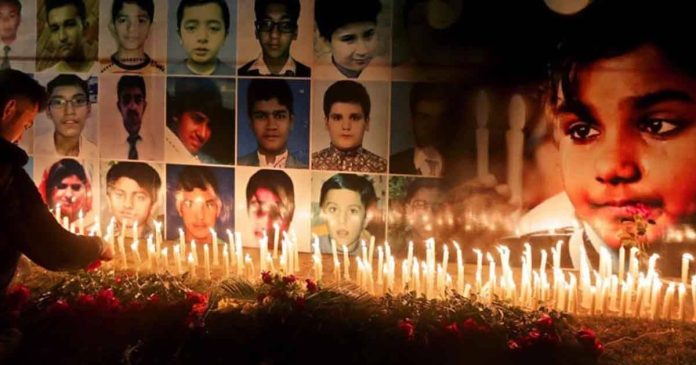Islamabad, Dec 17: Ten years ago, 16th December 2014 became an unforgettable dark day for Pakistan when a brutal terrorist attack at the Army Public School (APS) Peshawar claimed the lives of innocent children and teachers, leaving the nation in deep sorrow. The tragedy caused immense grief, especially for families like that of Sharif Gul, whose eldest son, Hassnain Sharif, a 10th-grade student, was among the 132 students martyred.
Recalling the devastating day, Sharif Gul shared how Hassnain, who aspired to become an SSG Commando in the Pakistan Army, had followed his usual morning routine—offering Fajr prayers and reciting the Holy Quran—before leaving for school with a kiss from his mother. Gul described Hassnain as a bright, obedient, and disciplined child who excelled in academics, sports, and extracurricular activities.
Gul was at work in Peshawar when news of the terrorist attack broke. Amid sounds of gunfire and explosions, he rushed to APS, only to learn later that his son had been martyred. Overwhelmed with emotion, he expressed pride in his son’s sacrifice, vowing to continue his mission and readiness to sacrifice further for the country.
The APS attack remains one of the most harrowing incidents in Pakistan’s history. On that day, six terrorists, disguised in military uniforms, stormed the school and opened indiscriminate fire, killing 147 people, including Principal Tahira Qazi, who courageously shielded her students. The attack left an indelible mark on the nation’s collective memory. Security forces responded swiftly, eliminating all the terrorists and saving many lives.
Ikhtiar Wali Khan, a former provincial assembly member, highlighted the attack as a turning point in Pakistan’s resolve against terrorism. He noted that the terrorists sought to undermine education and discourage the country’s youth but failed to break the nation’s spirit. The reopening of APS soon after the attack sent a strong message to terrorism’s supporters that Pakistan would not bow to such atrocities.
The APS tragedy led to the development of the National Action Plan (NAP), a comprehensive strategy to eliminate terrorism. Survivors of the attack became symbols of resilience. Among them, Ahmad Nawaz, who sustained critical injuries, emerged as an inspiration. Despite the loss of his brother Haris Nawaz in the attack, Ahmad pursued his education with determination, eventually becoming the youngest President of the Oxford Union in 2022, a prestigious platform with a history dating back to 1825.
Ahmad Nawaz’s achievement is a testament to courage and willpower. Dr. A. H. Hilali, former Chair of the Political Science Department at the University of Peshawar, praised Ahmad’s success, saying it proves that with resilience and hard work, any challenge can be overcome. Following an appeal from his father, the government facilitated Ahmad’s treatment abroad, providing Rs 30.6 million, and transferred him to Queen Elizabeth Hospital, Birmingham, in February 2015.
Even after a decade, the memories of the APS tragedy remain fresh in the hearts of every Pakistani. The sacrifices of the martyrs are honored annually, with people visiting their graves and offering Fateha. Families, including that of Hassnain Sharif, remember their loved ones as heroes whose sacrifices united the nation and strengthened its fight against terrorism.









